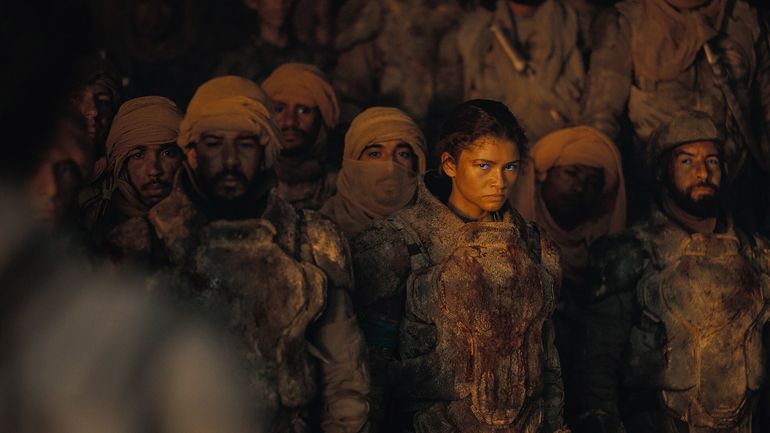
Dune 2 Ending: Unpacking the Conclusion and Post-Credits Scene

Explore how Dune 2 expands on Chani's character from the book, adding an exciting twist to the storyline.
Denis Villeneuve's Dune: Part One stayed very close to the original book, but Dune: Part Two takes a slightly different approach. This sequel not only faithfully adapts the rest of the first Dune novel into a movie, but it also includes some important character development that was not present in the book.
Warning: Spoilers ahead for the ending of Dune: Part Two.
Frank Herbert's writing style is unique, not your typical prose. It's more abstract, almost like reading a textbook about the story rather than the story itself. This results in Dune, the book, not fully developing its characters as complete human beings. However, Dune: Part Two, the movie, makes a deliberate effort to change that, especially with Chani (Zendaya) as she navigates Paul Atreides' (Timothee Chalamet) inevitable rise to power.
In the film, we witness Paul gradually assimilating into the Fremen way of life, impressing Chani and eventually sparking a romantic connection between them. But this is only the beginning of their story. Paul's ascent is not spontaneous; it is the culmination of centuries of Bene Gesserit prophecies. While many Fremen genuinely embrace these prophecies, Paul and Chani understand the truth - that it's all part of political schemes orchestrated by the Bene Gesserit.
Despite knowing exactly what's going on, Paul leans into his role in fulfilling these Bene Gesserit prophecies. Chani, however, is not amused by this at all. She believes the fundamentalists are foolish and tries to remind everyone that the Bene Gesserit both made the prophecies and planned for Paul to fulfill them. Unfortunately, her efforts are mostly ignored, especially considering that she herself ends up fulfilling one of these prophecies.
Paul, now known as Muad'dib among the Fremen and keeping his true identity hidden, leads the Fremen in their fight against the Harkonnen forces. This leads to significant progress in reclaiming Arrakis from the house that killed his father. As Arrakis and its spice hold immense importance for galactic civilization, the Emperor Shaddam, along with his daughter Irulan and the menacing Feyd-Rautha of the Harkonnen, head to Arrakis for a crucial meeting to swiftly resolve the conflict.
During the meeting, Paul challenges Feyd-Rautha for control of Arrakis and emerges victorious. With his newfound power, he demands that the Emperor step down from the throne for supporting the Harkonnens in the bloodshed on Arrakis. Paul then proposes to marry Irulan and take the Emperor's place. Surprisingly, Shaddam agrees to the terms and the deal is sealed.
Chani, on the other hand, is not pleased with the turn of events. The movie concludes with her walking away into the desert, attempting to summon a sand worm of her own to ride while dealing with her frustration towards Paul.
Chani is upset for various reasons. It's not just because her partner, Paul, is marrying someone else, even if it's just a political union. In the books, Paul and Chani remained committed even after Paul's marriage to Irulan, and in the movie, Paul had promised to stay faithful to her.
Chani's frustration is not solely rooted in jealousy. It's more about her annoyance with Paul throughout the film for embracing his supposed religious destiny. By the end of the movie, she's angry because Paul ignored her warnings and became the very thing she had tried to prevent.
It's a great way to end the note, especially if you're familiar with Chani's journey in Dune Messiah. The movie truly brings Chani to life as a complex character, even more so than Paul. It's really all about Chani in this film.
This new depth to Chani's character sets up an intriguing dynamic with Irulan in the next movie, if Villeneuve can finalize the script. Hopefully, we won't have to wait too long for it.
Is there a post-credits or mid-credits scene in Dune: Part Two?
No, there are no bonus scenes in Dune: Part Two. Once the credits start rolling, the movie is officially over with no extra scenes during or after the credits.
Editor's P/S:
Denis Villeneuve's "Dune: Part Two" takes a refreshing approach by expanding upon the character development of Chani, a crucial element lacking in Frank Herbert's novel. While staying faithful to the source material, the film delves deeper into Chani's complexities, exploring her resistance to Paul's destiny and her frustration with his political machinations. This enhanced characterization sets the stage for an intriguing dynamic with Irulan in future installments, showcasing the film's ability to transcend its literary origins and offer a more nuanced exploration of its characters.
The absence of post-credits or mid-credits scenes in "Dune: Part Two" is a testament to the film's self-contained nature. It concludes the narrative arc of the first novel, leaving no lingering threads or teasers for future installments. This decision allows the film to stand as a satisfying and complete cinematic experience, without resorting to cheap cliffhangers or unnecessary hype-building.







